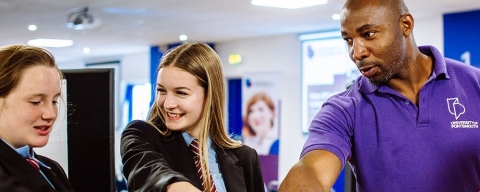
Showing content for section Overview
Overview
If you're looking for a rewarding career where you can make a positive difference to young people's lives, secondary teaching is a great choice.
On our secondary PGCE degrees - which were rated 'Outstanding' in Ofsted's latest review - you'll gain the skills and confidence you need to become an outstanding secondary school teacher.
On each of these teacher training degrees, you'll be supported by our tutors and school-based mentors as you learn to plan and deliver lessons with strong subject knowledge, confidence and imagination, while reflecting on what it means to teach at secondary level. You can study full time over one year, or part time over two.
We've got excellent links with many secondary schools in the region – so when you finish your PGCE, you'll graduate with excellent career prospects, and eligibility for Qualified Teacher Status (QTS) - the teaching qualification you'll need to teach in secondary schools in England and Wales.
Join our Postgraduate Open Events
From finding out which postgraduate option is right for you, to exploring the perfect course, browse our upcoming webinars and in-person events and book your place today.
Eligibility
This course accepts UK, EU, and International students. The part-time course is available to International students who do not require a Student Route Visa.
Our secondary PGCEs have three interconnected strands – Curriculum Studies, Professional Studies and School Experience – so the skills and knowledge you pick up can be practised and built on with teaching experience.
You'll hone your secondary teaching skills in whichever of the following subject areas you choose:
- English
- Mathematics
- Geography
- Modern Foreign Languages
- Science (with biology, physics or chemistry)
Course highlights
- Gain the skills, confidence and expertise to earn Qualified Teacher Status (QTS) - the teaching qualification you'll need to become a secondary school teacher in the UK and overseas
- Develop your teaching skills through work placements in real secondary schools and the study of theories and contemporary issues in secondary education
- Share your experience and learn from other PGCE students through lectures and seminars
- Learn key teaching skills, including lesson planning, classroom management, and special needs and inclusion
- Develop secondary-level knowledge in a subject area of your choice
- Work closely with mentors and other secondary school staff as part of your teacher training
- Study a range of topics including pedagogy and practice based research, lesson planning, behaviour management, assessment, and special education needs and inclusion
Recognised by:
This course leads to Qualified Teacher Status (QTS) on recommendation to the Teaching Regulation Agency (TRA).
The PGCE Secondary teacher training course was graded as 'Outstanding' by Ofsted in their 2024 inspection.
Trainees benefit from an exceptional training programme. The provider’s longstanding and successful collaboration with partner schools continues to flourish.
The coherent curriculum, refined over a long period, exemplifies ambition, rigour and aspiration. Partner schools relish welcoming trainees in as they ‘breathe oxygen into our schools’.
Study your PGCE with us
Discover our PGCE courses that can set you on the path to becoming a teacher. Whether you're interested in Primary, Secondary or Further Education, our PGCE courses will help you start a rewarding career in teaching.
Andrew: I really do think that people who come to Portsmouth to teach here will stay here for a really long time. At Portsmouth, we offer three different programmes for teacher training.
We have a Primary programme which you can come on as a post-grad or an undergrad.
We have a Secondary teacher training programme across a range of subject areas and we have an F.E. programme so if you want to teach 14 year olds to adults, the Further Education programme is ideal.
Tanya: The reason that I selected the Further Education strand rather than the Secondary was purely because of my specialism.
Being able to teach in Further Education meant that I was able to teach fashion in its fullest.
Andrew: We want the curriculum we offer at Portsmouth to be ambitious and we want it to be personalised for the students.
We put training in to help our trainees to really think about the needs of children that they're going to encounter and I'm really proud that our courses are tailored to be able to do that.
Tanya: When you first start, you will do a week or a few weeks specifically in university learning new skills, etc. and you then go on to get selected or given your placement.
Andrew: If you're on the Primary or Secondary programme, you have to train in two different schools and that would be the same on any teacher training programme that you're on.
We try to make sure there are contrasts in the placements to really give you a range of experiences and different types of pupils. That ultimately makes you more employable.
Jack: [For me], placement one at The Priory School in Southsea enabled me to really focus on behaviour management skills.
At St Edmund’s Catholic School for my second placement. I was then able to really hone in and practice my subject knowledge. It then allowed me to observe how outstanding lessons were delivered.
Andrew: On the Further Education programme, you spend the whole year in one college and that also has advantages because you really get to know those pupils over a very long period of time.
We put wellbeing and support for trainees right at the heart of what we do, and I think that's what's unique about Portsmouth.
You can train to teach anywhere, but you're not going to necessarily get that level of individual support from everybody.
Jack: I want to be a teacher because I want to make a difference. I really want to see that I can deliver English lessons and teach English in exciting, stimulating and creative ways.
The University of Portsmouth has been a great experience for this PGCE journey.
Tanya: If I'm honest, the University of Portsmouth has my heart. It's given me everything that I needed, from my undergraduate to my teaching degree and then beyond that as well. What more could you want really?
Contact information
Contact AdmissionsModules
Full-time
Core modules
You'll combine both subject knowledge enhancement and your growing understanding of teaching to show how you would teach a topic you feel less confident with.
On placement, you’ll be assessed on your teaching by your course leader and mentor, resulting in a final graded assessment for this phase with a target and action plan for the next term.
You’ll absorb specialised approaches to secondary teaching, from behaviour management to differentiated instruction. Along the way, you’ll gather evidence showcasing your readiness for QTS, from planning to assessment.
You’ll have a professional interview with your course leader at the end of your teaching practice to assess your progress.
You’ll be planning and teaching much more independently at this stage and working towards meeting all of the QTS Standards.
For your assessment, you’ll do a final professional interview and present of a file of supporting evidence and documentation.
You’ll have the chance to try out and reflect on how different approaches to teaching can enhance pupils' learning in the classroom, developing your confidence as a teacher.
Part-time
Core modules
You'll combine both subject knowledge enhancement and your growing understanding of teaching to show how you would teach a topic you feel less confident with.
On placement, you’ll be assessed on your teaching by your course leader and mentor, resulting in a final graded assessment for this phase with a target and action plan for the next term.
You’ll absorb specialised approaches to secondary teaching, from behaviour management to differentiated instruction. Along the way, you’ll gather evidence showcasing your readiness for QTS, from planning to assessment.
You’ll have a professional interview with your course leader at the end of your teaching practice to assess your progress.
Core modules
You’ll have the chance to try out and reflect on how different approaches to teaching can enhance pupils' learning in the classroom, developing your confidence as a teacher.
You’ll be planning and teaching much more independently at this stage and working towards meeting all of the QTS Standards.
For your assessment, you’ll do a final professional interview and present of a file of supporting evidence and documentation.

Join our Train to Teach webinar with Q&A
Tuesday 7 May 2024, 5pm - 6pm
Join us virtually on Tuesday 7 May to learn more about our teacher training courses.
The event will take place via Zoom and the programme is as follows:
- The Director of Initial Teacher Training will introduce our courses and answer any questions
- You can then choose a break-out room to discuss individual courses in greater depth
Changes to course content
We use the best and most current research and professional practice alongside feedback from our students to make sure course content is relevant to your future career or further studies.
Therefore, some course content may change over time to reflect changes in the discipline or industry. If a module doesn't run, we'll let you know as soon as possible and help you choose an alternative module.
Careers and opportunities
After you graduate this PGCE for secondary education, you'll be ready to start your teaching career on a minimum starting salary of £30,000, depending on where you teach in the UK. Over 90 per cent of Portsmouth PGCE graduates go into full-time teaching.
A PGCE, or Postgraduate Certificate in Education, is a teaching qualification recognised all over the world, so you'll also be able to teach overseas too, such as in Australia, Canada and the USA.
Once you're an established secondary teacher, you'll also have opportunities for further career progression in roles including Year Head and Subject Lead.
You could also go on to further study - this secondary PGCE will earn you 60 postgraduate credits you could put towards a full Master's degree (worth 180 credits) in the future, such as our MA Education Studies.
Qualified Teacher Status (QTS)
Each of our secondary PGCE degrees is an accredited qualification and once you graduate, you'll be eligible for Qualified Teacher Status (QTS).
QTS is awarded by the Teacher Regulation Agency (TRA) to identify that a person meets all the Teachers’ Standards and criteria. QTS is required in England to teach in a state school that is under local authority control and in special schools. QTS is also recognised in some countries outside England and Wales.
The University does a really good chunk of mentor training to ensure the mentors are prepared for their mentees. There is a lot of variety to the University days, we’ve had some great workshops on things like voice projection and mindfulness which have been brilliant.
I’ve been lucky enough to already secure a position for next year and that solely has come down to the preparation the University have helped us with.
Career planning
During your course you'll have expert career support from your tutors and from our Careers and Employability Centre, which you can access for 5 years after you graduate.

You'll benefit from:
- Networking events
- 1-to-1 appointments
- CV and cover letter advice
- Interview preparation and practice
- Workshops to enhance your employability skills
- Recruitment events including the Student and Graduate Opportunities Fair
- Support starting your own business
Teaching placements
As part of this secondary teaching course degree, you'll spend at least 120 days on placement in two secondary schools, working with secondary pupils and teaching professionals.
You'll gain real secondary teaching experience in real classrooms, putting your theoretical learning into practice and building practical teaching skills and techniques you can take with you into your secondary teaching career.
You'll have support from two school-based mentors throughout your secondary teaching placements. Your subject mentor will work with you day to day to help you develop your secondary teaching, lesson planning and classroom skills, while your professional mentor oversees your wider professional development and offers training and support on issues related to the Teachers’ Standards.
How you'll spend your time
We recognise that you'll probably be juggling more demands when you do your PGCE, as you may be working or you may have family responsibilities.
We'll give you as much indication here as we can of how much time you'll need to be on campus and how many hours you can expect to spend in self-directed study, but please note that these indications are always subject to change. You should receive your full timetable several weeks before you start with us.
It is our expectation that all international students will join us here on campus in Portsmouth.
Course structure
Our secondary PGCE courses will take:
- 1 year (full-time study)
- 2 years (part-time study)
The full-time version of this teacher training degree lasts 38 weeks, between September and June. One third of your time will be spent in University-based sessions, and you'll spend the rest of your time on the course working in at least two of our partner secondary schools.
If you study part-time over two years, you'll spend three days a week in your placement secondary school, in a different school each year. Your university based training is split across the two years so you'll learn in a way that complements your development as a secondary teacher.
Most University-based teaching takes place during the day on Fridays, though during the first few weeks of the course you are on campus every day. Generally, Monday-Thursday is spent at your placement school.
Dedication, passion and commitment characterise mentoring. Underpinned by accurate target setting and deliberate and meaningful practice, trainees’ preparation for the next stage of their career is highly effective.
All involved in the partnership are relentless in their pursuit of making improvements so that the training is of the highest quality.
Teaching
PGCE study is deeper and more specialised than an undergraduate degree. This means you'll focus on something that really matters to you and your career as you work closely with academics committed to helping you become a secondary teacher.
You'll spend more time in independent study and research than you did for your undergraduate degree, but the majority of your teaching time will be in-person and face-to-face.
Teaching methods on this course include:
- work-based learning
- supervised teaching practice
- lectures
- group participation
- guided reading
You can access all teaching resources on Moodle, our virtual learning environment, from anywhere with a Web connection.
How you're assessed
The assessments that you'll complete on this PGCE are designed to ensure that you meet the Standards for Qualifying to Teach.
In each term you'll be assessed through:
- The development of your teaching skills
- A formal assignment
- An interview in which you'll demonstrate the evidence collected towards the standards including your subject knowledge
Throughout the course, you'll also collate a portfolio of evidence based on schoolwork, observations of teaching, tasks and assignments.
Term dates
September start
The PGCE academic year runs from September to the following June/July. There are breaks at Christmas and Easter, and half terms in October, February and May.
Supporting you
You'll get support via video, phone and face-to-face from teaching and support staff when you need it. These include the following people and services:
Types of support
Your personal tutor is usually your PGCE course leader. They give you academic and personal support throughout your time at university.
You also get 2 school-based mentors when you’re on placement. Your professional mentor oversees your professional development and offer training and support on issues related to the Teachers’ Standards. Your subject mentor works with you day-to-day. They provide subject-specific feedback and support you with lesson planning and enhancing your knowledge of the subject you teach.
You'll have help from a team of faculty learning development tutors. They can help you improve and develop your academic skills and support you in any area of your study.
They can help with:
- Improving your academic writing (for example, essays, reports, dissertations)
- Delivering presentations (including observing and filming presentations)
- Understanding and using assignment feedback
- Managing your time and workload
- Revision and exam techniques
As well as support from faculty staff and your personal tutor, you can use the University's Academic Skills Unit (ASK).
ASK provides one-to-one support in areas such as:
- Academic writing
- Note taking
- Time management
- Critical thinking
- Presentation skills
- Referencing
- Working in groups
- Revision, memory and exam techniques
If you have a disability or need extra support, the Additional Support and Disability Centre (ASDAC) will give you help, support and advice.
You'll get occupational health support for your physical, mental and social wellbeing when you’re on placement. If you need more specialist support, we can arrange a referral on your behalf to the Occupational Health Service.
Our online Learning Well mini-course will help you plan for managing the challenges of learning and student life, so you can fulfil your potential and have a great student experience.
You can get personal, emotional and mental health support from our Student Wellbeing Service, in person and online. This includes 1–2–1 support as well as courses and workshops that help you better manage stress, anxiety or depression.
If you require extra support because of a disability or additional learning need our specialist team can help you.
They'll help you to
- discuss and agree on reasonable adjustments
- liaise with other University services and facilities, such as the library
- access specialist study skills and strategies tutors, and assistive technology tutors, on a 1-to-1 basis or in groups
- liaise with external services
Library staff are available in person or by email, phone, or online chat to help you make the most of the University’s library resources. You can also request one-to-one appointments and get support from a librarian who specialises in your subject area.
The library is open 24 hours a day, every day, in term time.
If English isn't your first language, you can do one of our English language courses to improve your written and spoken English language skills before starting your degree. Once you're here, you can take part in our free In-Sessional English (ISE) programme to improve your English further.
I really would recommend the University of Portsmouth, really for that individual support that I’m getting.
I really feel that any issues that I have, there is somebody to speak to whenever that time is.

Need to fill some subject knowledge gaps?
If you're not feeling sure of your subject area knowledge before you start your secondary teacher training, don't worry.
Boost your understanding and confidence with our subject knowledge enhancement courses - free if you've accepted a place on the next intake of an Initial Teacher Training course.
Course costs and funding
Tuition fees (September 2024 start)
UK/Channel Islands and Isle of Man students
- Full-time – £9,250
- Part-time – £4,625 per year
EU students
- Full-time – £9,250 a year
- Part-time – £4,625 per year
(figures include Transition Scholarship)
International students
- Full-time – £17,200
- Part-time – £8,600 per year
All fees subject to annual increase.
UK/Channel Islands and Isle of Man students
- Full-time – £9,250
- Part-time – £4,625 per year
EU students
- Full-time – £9,250 a year
- Part-time – £4,625 per year
(figures include Transition Scholarship)
International students
- Full-time – £17,200
- Part-time – £8,600 per year
All fees subject to annual increase.
UK/Channel Islands and Isle of Man students
- Full-time – £9,250
- Part-time – £4,625 per year
EU students
- Full-time – £9,250 a year
- Part-time – £4,625 per year
(figures include Transition Scholarship)
International students
- Full-time – £17,200
- Part-time – £8,600 per year
All fees subject to annual increase.
UK/Channel Islands and Isle of Man students
- Full-time – £9,250
- Part-time – £4,625 per year
EU students
- Full-time – £9,250 a year
- Part-time – £4,625 per year
(figures include Transition Scholarship)
International students
- Full-time – £17,200
- Part-time – £8,600 per year
All fees subject to annual increase.
UK/Channel Islands and Isle of Man students
- Full-time – £9,250
- Part-time – £4,625 per year
EU students
- Full-time – £9,250 a year
- Part-time – £4,625 per year
(figures include Transition Scholarship)
International students
- Full-time – £17,200
- Part-time – £8,600 per year
All fees subject to annual increase.
Funding your studies
Find out more how to fund your teacher training, including the scholarships and bursaries you could get. You can also find more about tuition fees and living costs, including what your tuition fees cover.
If you're a UK student, you may be eligible for a Government postgraduate loan, which you can use to help with course fees and living costs.
Applying from outside the UK? Find out about funding options for international students.
Additional course costs
These course-related costs aren't included in the tuition fees. So you'll need to budget for them when you plan your spending.
Additional costs
Our accommodation section show your accommodation options and highlight how much it costs to live in Portsmouth.
You’ll study up to 6 modules a year. You may have to read several recommended books or textbooks for each module.
You can borrow most of these from the Library. If you buy these, they may cost up to £60 each.
We recommend that you budget £75 a year for photocopying, memory sticks, DVDs and CDs, printing charges, binding and specialist printing.
If your final year includes a major project, there could be cost for transport or accommodation related to your research activities. The amount will depend on the project you choose.
There may be travel costs for optional internships/placements. These will vary depending on the nature of internship/placement and can range from £50 - £1000.
Entry requirements
Eligibility
This course accepts UK, EU, and International students. The part-time course is available to International students who do not require a Student Route Visa.
PGCE Courses entry requirements (September 2024 start)
Qualifications or experience
- An honours degree in a relevant subject, with approximately 50% English content and a classification of at least 2:2.
- GCSE Mathematics and English language at grade C (Grade 4) or above, or equivalent.
English language requirements
- Applicants whose first language is not English, and who do not have GCSE English language at grade C (Grade 4) or above, require English language proficiency at a minimum of IELTS band 6.5 with no component less than 6.0.
If you don't meet the English language requirements yet, you can achieve the level you need by successfully completing a pre-sessional English programme before you start your course.
Selection process
- All shortlisted applicants are subject to interview.
- All offers are subject to Enhanced Disclosure and Barring Service (DBS) clearance and Occupational Health clearance.
Qualifications or experience
- A good honours degree or equivalent in a relevant subject, with approximately 50% geographical content. A minimum of 2:1 is desirable although applicants with other qualifications or valuable experience will also be considered.
- GCSE Mathematics and English language at grade C (Grade 4) or above, or equivalent.
English language requirements
- Applicants whose first language is not English, and who do not have GCSE English language at grade C (Grade 4) or above, require English language proficiency at a minimum of IELTS band 6.5 with no component less than 6.0.
If you don't meet the English language requirements yet, you can achieve the level you need by successfully completing a pre-sessional English programme before you start your course.
Selection process
- All shortlisted applicants are subject to interview.
- All offers are subject to Enhanced Disclosure and Barring Service (DBS) clearance and Occupational Health clearance.
Qualifications or experience
- A good honours degree or equivalent in a relevant subject, with approximately 50% Mathematics content.
- GCSE Mathematics and English language at grade C (Grade 4) or above, or equivalent.
English language requirements
- Applicants whose first language is not English, and who do not have GCSE English language at grade C (Grade 4) or above, require English language proficiency at a minimum of IELTS band 6.5 with no component less than 6.0.
If you don't meet the English language requirements yet, you can achieve the level you need by successfully completing a pre-sessional English programme before you start your course.
Selection process
- All shortlisted applicants are subject to interview.
- All offers are subject to Enhanced Disclosure and Barring Service (DBS) clearance and Occupational Health clearance.
Qualifications or experience
- A good honours degree or equivalent in a relevant subject, with a minimum of 50% content in an appropriate modern foreign language. Alternatively, native speakers require excellent communication skills in English.
- A second language to A level (or equivalent standard) in French, German or Spanish. Applicants offering only one foreign language are able to complete a short intensive Enhancement Course in French in order to achieve sufficient competence to teach a second language accurately and confidently at secondary level to at least Key Stage 3.
- GCSE Mathematics and English language at grade C (Grade 4) or above, or equivalent.
English language requirements
- Applicants whose first language is not English, and who do not have GCSE English language at grade C (Grade 4) or above, require English language proficiency at a minimum of IELTS band 6.5 with no component less than 6.0.
If you don't meet the English language requirements yet, you can achieve the level you need by successfully completing a pre-sessional English programme before you start your course.
Selection process
- All shortlisted applicants are subject to interview. All offers are subject to Enhanced Disclosure and Barring Service (DBS) clearance and Occupational Health clearance.
Qualifications or experience
- A good honours degree or equivalent in a relevant subject, with approximately 50% science content. A minimum of 2:2 is desirable although applicants with other qualifications or valuable experience will also be considered.
- GCSE Mathematics and English language at grade C (Grade 4) or above, or equivalent.
English language requirements
- Applicants whose first language is not English, and who do not have GCSE English language at grade C (Grade 4) or above, require English language proficiency at a minimum of IELTS band 6.5 with no component less than 6.0.
If you don't meet the English language requirements yet, you can achieve the level you need by successfully completing a pre-sessional English programme before you start your course.
Selection process
- All shortlisted applicants are subject to interview.
- All offers are subject to Enhanced Disclosure and Barring Service (DBS) clearance and Occupational Health clearance.
If you're in doubt about your qualifications or suitability for the course please contact the relevant course leader for advice.
Equivalency qualifications in place of GCSEs
If you don't have a GCSE in Maths or English, you can still apply for this course. We accept equivalency qualifications in place of these GCSEs, which you can obtain from one of two providers - Equivalency Testing or A Star Equivalency.
These providers also offer discounts for PGCE offer holders. To find out more about equivalency qualifications for this PGCE, please email us.
Apply
Please apply for a secondary PGCE course through the Department for Education. You'll need the DfE training code for your chosen subject:
| to apply for: | use code: |
|---|---|
| English | Q3X1 |
| Geography | F8X1 |
| Mathematics | G1X1 |
| Science with Biology | CX11 |
| Science with Chemistry | F2X1 |
| Science with Physics | F3X2 |
| Spanish and French | RX41 |
| French and Spanish | RXD1 |
| French and German | RX11 |
| French and Italian | RX31 |
| French and Mandarin | TX31 |
| German and French | RX21 |
Admissions terms and conditions
When you accept an offer to study at the University of Portsmouth, you also agree to abide by our Student Contract (which includes the University's relevant policies, rules and regulations). You should read and consider these before you apply.




